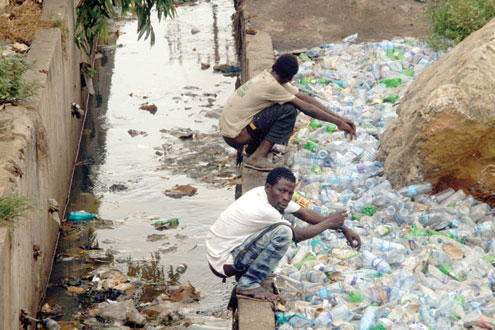
A recent report by UNICEF raised the alarm that poor hygiene and entrenched culture of open defecation among millions around the world would continue to put children and their communities at risk. The situation had reached a worst dimension in Nigeria where about 119 million of the estimated 174 million population were not using safe toilets.
According to UNICEF, “Nigeria is among the top five countries in the world with high population that practice open defecation and number of open defecators has been on increase since 1990. Lack of a safe, clean toilet and practice of open defecation has seriously impacted people’s health, wellbeing and dignity as well as efforts towards poverty reduction, economic and social development and the environment.”
The agency’s Communication Specialist for Nigeria, Geoffrey Njoku said, “The call to end the practice of open defecation is being made with growing insistence from the United Nations which is being led by the office of the Deputy Secretary General, encouraging countries to prioritize investments in sanitation and develop appropriate interventions to end the menace.
In the same vein, Bisi Agberemi, a UNICEF Water Sanitation and Hygiene Specialist, noted thatt, the Federal Government must accelerate efforts to eliminate open defecation in the country, this was necessary as open defecation was still the leading cause of preventable child deaths. Agberemi quoted the 2013 National Demographic Health Survey, which shows that only 28.7 per cent Nigerians had access to basic sanitation facilities. This, he said, needed to be scaled up through continued sustainability of practices such as hand washing to achieve an open defecation-free Nigeria.
The specialist also called for increased funding of sanitation, saying that awareness should be promoted at all levels of government to harmonize sanitation policies and cultivate habit of cleanliness at all times.
Although figures may look exaggerated, the reality is that millions of Nigerians answer the call of nature, some, at times in full view of the public, either out of ignorance or because they have absolutely nowhere else to do so. It is a crying shame that our country has been turned into one giant public lavatory.
Surprisingly, authorities with direct responsibility to provide such facilities have lacked the will to enunciate and execute policies that will place emphasis on the provision of sanitation facilities and public awareness about personal hygiene. This lack of will may not be unconnected with the vote-catching inclination of elected officials who place a higher emphasis on white elephant and ostentatious projects that can be seen to the neglect of other equally important amenities like sanitation facilities that will not qualify as “legacy projects”.
Housing is also one of the most important basic necessities of mankind known to tremendously affect human health and well-being. It is an indispensable part of ensuring human dignity. Housing is essential for normal healthy living as it fulfils deep-seated psychological needs for privacy and personal space; physical needs for security and protection from inclement weather; and social needs for basic gathering points where important relationships are forged and nurtured. However, despite global recognition of the importance of housing to human welfare and survival, it is estimated that over one billion people live in inadequate housing while over 100 million people are homeless. In Nigeria, official statistics is that there is a 17 million housing deficit.
Governments claim lack of capacity and resources to implement programs and undertake reforms aimed at creating the conditions for expanding access to housing. The right to adequate housing therefore provides a unique paradigm for monitoring the steps taken by states towards the provision of housing through citizens’ demands and insistence upon the fulfilment of this basic human right. It is widely acknowledged that adequate housing is essential for good life, it has been noted as a key requirement for an efficient and satisfied labour force and the foundation of satisfactory community life. Furthermore, researchers have shown that housing can affect mental and physical health, both positively and negatively
But then, Nigeria’s Federal Ministry of Housing and Environment has yet to come up with a definite housing standard for the country. This might be one of the reasons for poor public hygiene practices.
Ideally, there should be construction and house building standards that suit the economic capacity of the poor and rich. Environmental sustainability and efficient management was enlisted among 8 goals of Millennium Development Goals, MDGs as agreed by the United Nations in 2000 and Nigeria was a part. While Nigeria has received commendation for being in line to meeting some of the goals, it is cynically criticized for poor hygiene.
